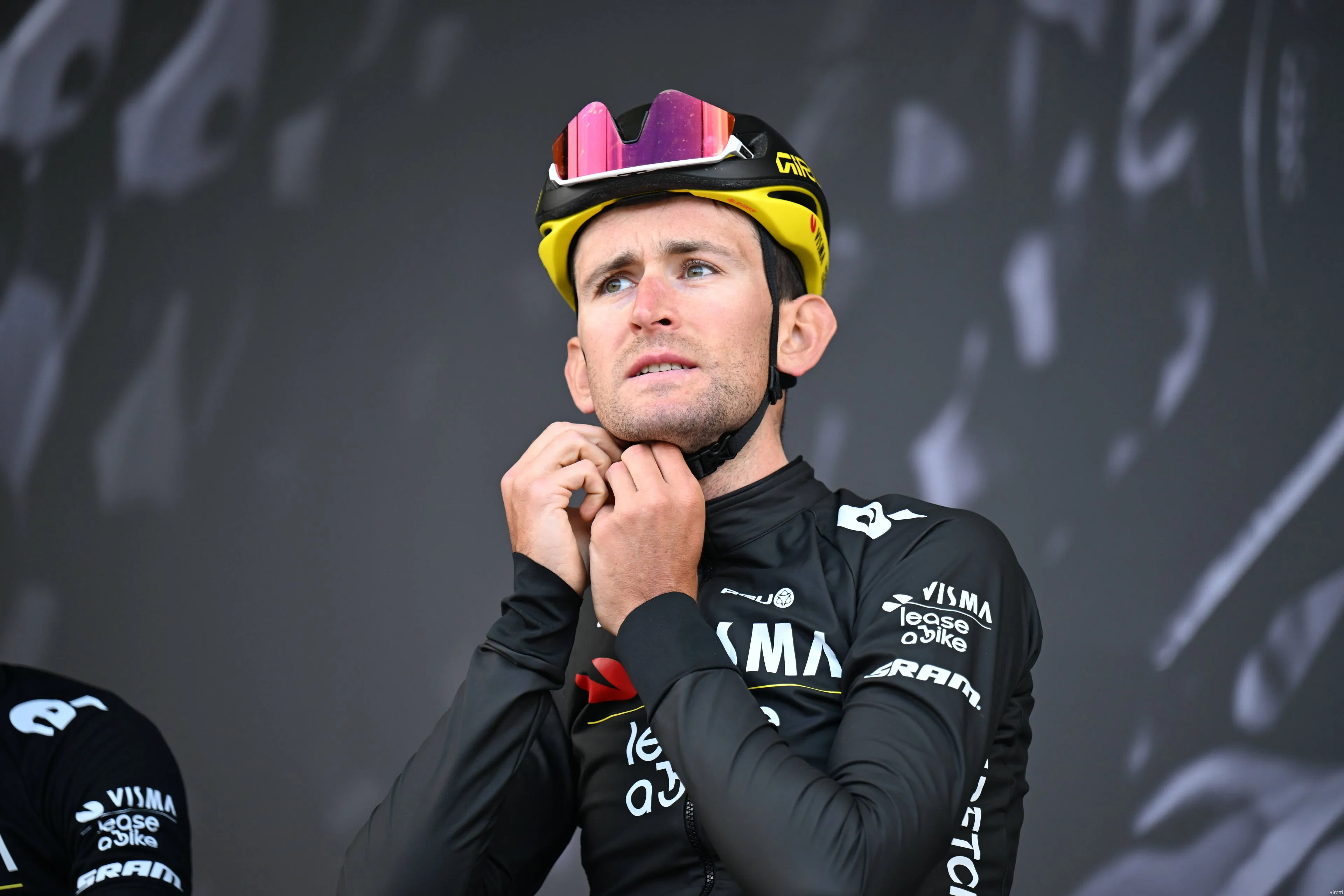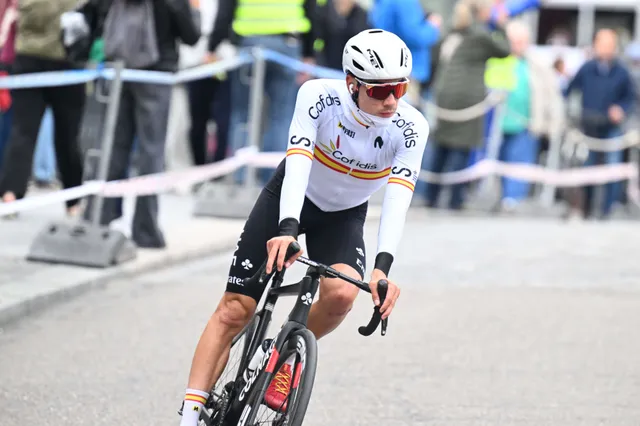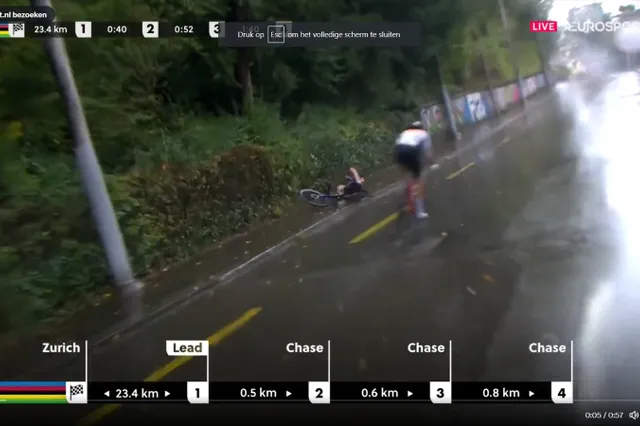Benoot and Plugge open attack on UCI after death Furrer: "We go back 20, 30 years in time"
Cycling
After the death of 18-year-old Muriel Furrer at the World Cycling Championships in Zurich, the debate about safety in the peloton has reopened. Earlier, Juan Ayuso was hard on the UCI and now Tiesj Benoot has also raised his voice about the incident and how it could have been prevented.
The details regarding the fatal accident are still unclear, but what is certain is that Furrer lived alone next to the road for a long time, a very long time. And that while plenty of technology is already available to report the crash. "For example, Garmin has a crash detection system," Tiesj Benoot told Het Laatste Nieuws. "I have already had the opportunity to see that it works well for myself. We once had our bikes parked against a wall when we went for a coffee. One of those bikes fell over, and an alarm signal was sent immediately."
These techniques are still under development. For example, some devices require a connection to a phone or even a helicopter. But the Belgian of Visma | Lease a Bike doesn't want to use that as an excuse. "Technology cannot be the problem. With everything that exists, locating a person who has crashed should be possible. We already race with a transponder under the saddle that measures time differences. It seems like only a small step to use that to track someone's exact location as well."
Read more below the photo.

"If you can save one human life with technology, it's worth it"
For now, cycling sees no progression in the use of new technology. Indeed, the UCI wants to return to the days when devices were unnecessary. Thus, the cycling federation intends to encourage an unpredictable "natural" sport. "I get that," the Belgian responded. "But some things are more important. If the focus is always on spectacle, we are doing Roman Games. If the UCI is afraid of data being passed on, they should develop their neutral system, then they can monitor it themselves." That may cost a lot of money, but that shouldn't be a factor, according to Benoot. "When I see how much we are giving up to the UCI, it has plenty of money."
Several years ago, the demand for racing without earpieces was still quite loud, as was the demand for it in the peloton. After years of testing, the result is clear. "I have to be honest. I also used to think that without earpieces, you could race more freely and think more tactically, but that's not true. Without earpieces, we are often so badly informed about the race situation that we just don't know what to do. That has nothing to do with tactics anymore and doesn't necessarily make for better racing. And vice versa: are one-day races with earpieces that boring? I think a lot of classics are worth watching. I think spectacle is an empty argument from the UCI."
Earpieces can also play a crucial role in terms of safety. Benoot thinks the race itself would not have become safer if people had used earpieces, but: "In the case of that girl: maybe she could have asked for help, or maybe a colleague could have reported that something had happened. Now, none of that was possible. Aren't those enough reasons to always use earpieces? It is quite simple: what happened in Zurich is a particular case. But it is always worth it if you can save one human life by enabling technology. No matter what disadvantages it might bring."
Read more below the photo.

Plugge wants progression, not regression: "The UCI is falling way behind"
Richard Plugge, general manager of Benoot's team, is also worried about the UCI's attitude. He sees every major sport moving forward, but cycling, he says, needs to catch up. "At World Championships, just look at the soccer World Championship, innovations are introduced. And at the cycling World Championships, we go 20, 30 years back in time," he told Het Nieuwsblad. "And then suddenly we are riding without earpieces, nobody knows who is racing, and we are riding with fewer riders per team. Everything goes back in time, while you would expect the World Championship to be an example of innovation within our sport. Only the UCI continues to fall way behind in this."
Like his Belgian pupil, the general manager of Visma | Lease a Bike sees no benefit in the absence of earpieces. They make the race safer. "Because you can inform people about dangerous points, and if something has happened. Other riders can tell the team leader that someone has crashed. It's a form of communication, and in emergencies, you always want to be able to communicate. You shouldn't take that away if that opportunity is there."
The calendar for the new cyclo-cross season is now online! Check it out here. Or check out our general calendars for the remainder of the season for the men and women's races.
Read also
IDL-productions

Interesting press conference from Pedersen after Gent-Wevelgem: "It's not like I'm thinking, oh, I miss Mathieu"

Preview Dwars door Vlaanderen 2025 | Pedersen and Van Aert return to the race where things went wrong last year

"What he did was actually very stupid": Lidl-Trek left stunned by their own team leader after Gent-Wevelgem raid

'What if' doesn’t matter, as Visma | Lease a Bike knows all too well after Gent-Wevelgem: "Tough to take, but that’s racing"

Adrie van der Poel watches son Mathieu in awe ("as a former pro, I know what it takes") and gives Wout van Aert credit
Latest Cycling News

What did they do on Gent-Wevelgem day? Van der Poel tests E3 golf balls, van Aert responds to Strava comment

Interesting press conference from Pedersen after Gent-Wevelgem: "It's not like I'm thinking, oh, I miss Mathieu"

Preview Dwars door Vlaanderen 2025 | Pedersen and Van Aert return to the race where things went wrong last year

Visma | Lease a Bike (besides Kooij) in the spotlight: Bike (and Veenhoven?) in the water, Jorgenson with flashy glasses

It's enough: Lotto recognizes Arnaud De Lie is falling behind and withdraws him from races
Popular Cycling News

🎥 They didn't show this on TV: This is what the peloton did with Wout van Aert on the Paterberg and after the Oude Kwaremont

Cycling legend De Vlaeminck doesn't hold back criticism: from "Van der Poel sat in the wheels for 250 kilometers" to "We used to ride all the races too"

Ganna forced by INEOS Grenadiers to ride Tour of Flanders — even though he doesn’t want to

Van Aert draws harsh conclusion after failed comeback in E3: "I was here to achieve a good result"

"What he did was actually very stupid": Lidl-Trek left stunned by their own team leader after Gent-Wevelgem raid
Latest Comments
- Such negative comments that are truly inappropriate and actually ridiculous. He sounds like an old man, bitter that he can't race anymore. Why can't he just be gracious? Or just shut up. Instead of howling for attention, in such a rude manner. Must be Dementia creeping in. We are all living in the Now. Records are there, and some are being broken, some are unapproachable. If he doesn't like it, and it makes him sick, maybe he ought start watching some other sport. Don't want the old mans health to be upset.
 reemmo031-03-2025
reemmo031-03-2025 - Roger De Vlaeminck inspires me to create a new beer: "Bitter Old Twat Belgian".JackInhof31-03-2025
- Shoot, I'll ride it for 1/10 of what his pay for that day is😅Veganpotter30-03-2025
- What is this? The Lance Armstrong daily cheaters channel? I could care less about Johan and Lance the seven times cheater. Greg Lemond was right all along, Why don't you write about that instead of these two knuckleheads.velodrone28-03-2025
- Are we all doomed to hear from Lance Armstrong and Johan bruneel until the end of time? It's not enough the stain they left on cycling? Do we have to see that shadow forever?bigyakman26-03-2025
- I am not sure if it is the hardest to win. In Flanders and Roubaix well before the finish the Peleton will be decimated and the race will normally be won by the best rider of the day or maybe 2nd or 3rd in case of a mechanical or unlucky break especially in case of Roubaix. In San Remo just before the finish there will still be several riders in contention and they are hard to ditch. For the best riders it is a race hard to win since it is not so selective. But if you are not a top 5 rider but still a top 10 rider this race is your best change to win. You will see more Milan San remo Winners with only 1 monument win than any other monumentsJoostmehrtens19-03-2025
- "fap fap fap oh Lance oh oh OHHHHHHH" again. Does he pay you to dredge up people with nice things to say about him? He was an giant a$$hole to people. It is a fact. Whatever his contrition about the doping, he is unapologetic about being a giant a$$hole to people. (Why yes, I do only login to complain. *I* am however only a giant a$$hole to people who laud giant a$$holes.)ericjensenridesbikes25-02-2025
- Remco is still very young. And injuries can absolutely keep you from overdoing it and getting worse. The recent Remco accident didn't keep him from being able to ride a recumbent inside. Wout's knee is a different story thoughVeganpotter23-01-2025
- Van der Poel style is winning by a half a lap and leading the race from the end of the second lap.
 Barnes127420-01-2025
Barnes127420-01-2025 - If she thinks talent alone will put her there she will not see many podium finishes much less a GC finish.....work as a team utilizing tactics to consistently be at the top.Germanrazor10-01-2025


